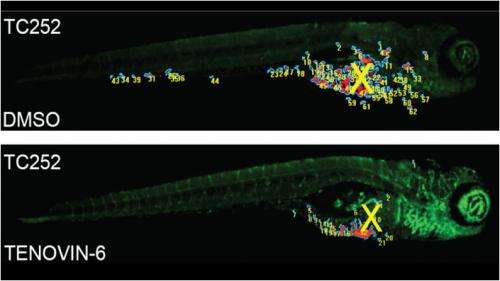New potential therapeutic strategy against a very aggressive infant bone cancer

Researchers at the Bellvitge Biomedical Research Institute (IDIBELL), led by Oscar Martínez Tirado participated in an international study which suggests inhibition of Sirtuin1 (SIRT1) protein as a future treatment option for metastatic Ewing sarcoma. The results of the study were published in the journal Cancer Research.
Ewing's Sarcoma
Ewing's sarcoma is the second most common bone cancer and affects children and adolescents. Currently, if diagnosed in time and there is no metastasis, it can be cured in 80% of cases but between 25% and 30% of cases are diagnosed when there is already metastasized, at which low survival to 30 %.
The study published in Cancer Research demonstrates that overexpression of the protein sirtuin 1 very significantly correlated with metastasis in patient samples Ewing Sarcoma. The head of the research group in sarcomas IDIBELL and co-author of the study, Óscar Martínez Tirado, explained that "this is a new marker of metastasis which also can be inhibited with specific drugs. This opens the door to treatment these tumors so aggressive. "
The mechanism
Previous studies show that the NOTCH pathway acts as a tumor suppressor in Ewing sarcoma and that the SIRT1 protein is one of those responsible for keeping it inhibited so that the cancer can continue developing up to the stage of metastasis.
Researchers have tested SIRT1 inhibitors in zebrafish models and seen that in animals treated, tumor cells lose their ability to proliferation and migration, whereas in untreated animals, the tumor cells spread throughout the body generating metastasis.
The next step in this international collaboration is to make toxicity tests to SIRT1 inhibitors in order to raise a European clinical trial aimed at improving the treatment of patients with metastatic Ewing's Sarcoma.
More information: Ban J., Aryee D.N.T., Fourtouna A., van der Ent W., Kauer M., Niedan S., Machado I, Rodriguez-Galindo C., Tirado O.M., Schwentner R., Picci P., Flanagan A.M., Berg V., Strauss S.J., Scotlandi K., Lawlor E.R., Snaar-Jagalska E., Llombart-Bosch A. Qnd Kovar H. Suppression of deacetylase SIRT1 mediates tumor-suppressive NOTCH response and offers a novel treatment option in metastatic Ewing sarcoma. Cancer Research. 2014 Nov 15;74(22):6578-88














